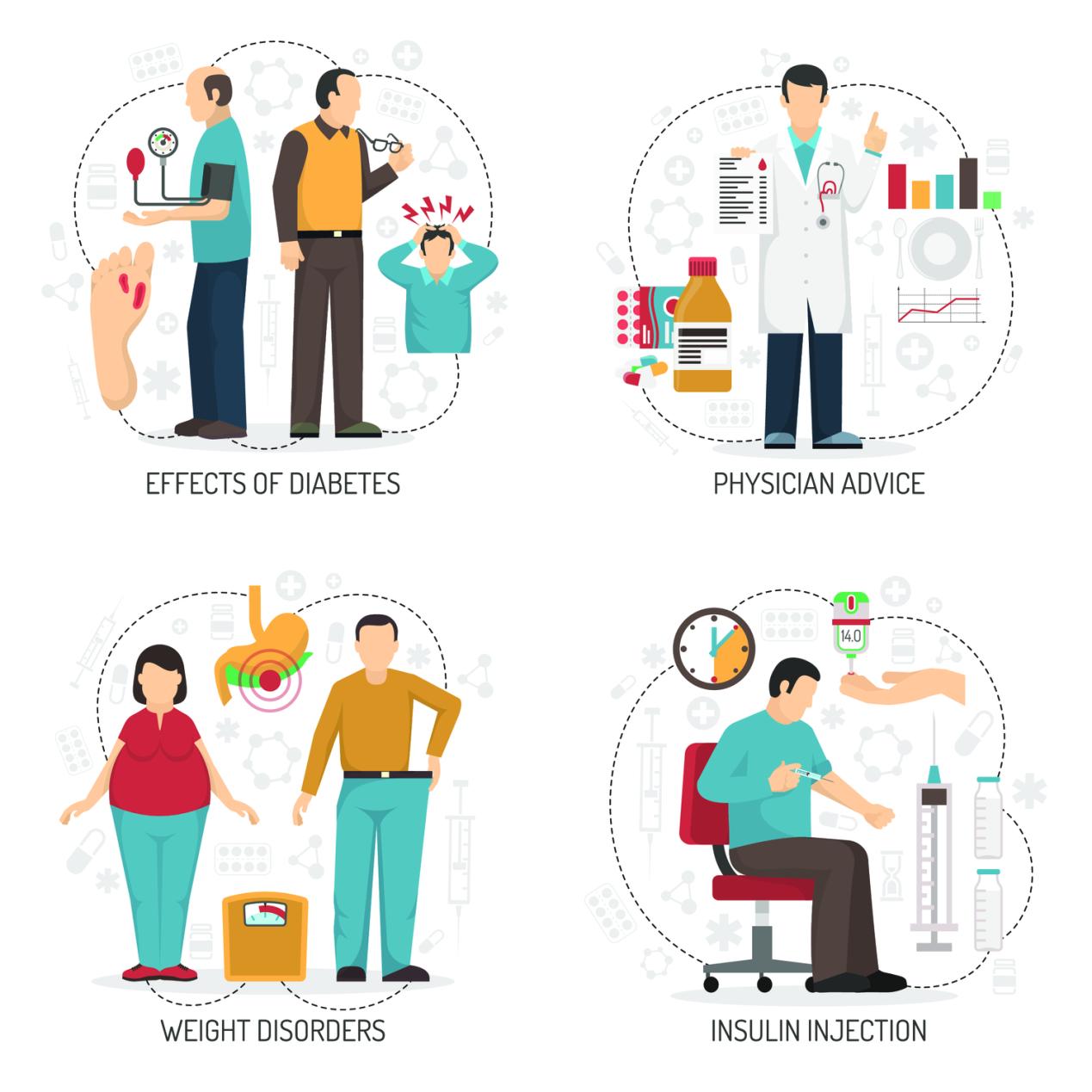Diabetes (diabetes mellitus) is a complicated condition and there are many different types of diabetes. Here we’ll take you through everything you need to know.
There are three main types of diabetes: type 1, type 2, and gestational diabetes (diabetes while pregnant).
Type 1 Diabetes
Type 1 diabetes is thought to be caused by an autoimmune reaction (the body attacks itself by mistake) that stops your body from making insulin. Approximately 5-10% of the people who have diabetes have type 1. Symptoms of type 1 diabetes often develop quickly. It’s usually diagnosed in children, teens, and young adults. If you have type 1 diabetes, you’ll need to take insulin every day to survive. Currently, no one knows how to prevent type 1 diabetes.
Type 2 Diabetes
With type 2 diabetes, your body doesn’t use insulin well and can’t keep blood sugar at normal levels. About 90-95% of people with diabetes have type 2. It develops over many years and is usually diagnosed in adults (but more and more in children, teens, and young adults). You may not notice any symptoms, so it’s important to get your blood sugar tested if you’re at risk. Type 2 diabetes can be prevented or delayed with healthy lifestyle changes, such as losing weight, eating healthy food, and being active.
Gestational diabetes develops in pregnant women who have never had diabetes. If you have gestational diabetes, your baby could be at higher risk for health problems. Gestational diabetes usually goes away after your baby is born but increases your risk for type 2 diabetes later in life. Your baby is more likely to have obesity as a child or teen, and more likely to develop type 2 diabetes later in life too.
Symptoms of diabetes
If you have any of the following diabetes symptoms, see your doctor about getting your blood sugar tested:
● Urinate (pee) a lot, often at night
● Are very thirsty
● Lose weight without trying
● Are very hungry
● Have blurry vision
● Have numb or tingling hands or feet
● Feel very tired
● Have very dry skin
● Have sores that heal slowly
● Have more infections than usual
Diabetes complications
Over time, having too much glucose in your blood can cause complications, including:
Eye disease, due to changes in fluid levels, swelling in the tissues, and damage to the blood vessels in the eyes
Foot problems, caused by damage to the nerves and reduced blood flow to your feet
Gum disease and other dental problems, because a high amount of blood sugar in your saliva helps harmful bacteria grow in your mouth. The bacteria combine with food to form a soft, sticky film called plaque. Plaque also comes from eating foods that contain sugars or starches. Some types of plaque cause gum disease and bad breath. Other types cause tooth decay and cavities.
Heart disease and stroke, caused by damage to your blood vessels and the nerves that control your heart and blood vessels
Kidney disease, due to damage to the blood vessels in your kidneys. Many people with diabetes develop high blood pressure. That can also damage your kidneys.
Nerve problems (diabetic neuropathy), caused by damage to the nerves and the small blood vessels that nourish your nerves with oxygen and nutrients
Sexual and bladder problems, caused by damage to the nerves and reduced blood flow in the genitals and bladder
Skin conditions, some of which are caused by changes in the small blood vessels and reduced circulation. People with diabetes are also more likely to have infections, including skin infections.

What other problems can people with diabetes have?
If you have diabetes, you need to watch out for blood sugar levels that are very high (hyperglycemia) or very low (hypoglycemia). These can happen quickly and can become dangerous. Some of the causes include having another illness or infection and certain medicines. They can also happen if you don’t get the right amount of diabetes medicines. To try to prevent these problems, make sure to take your diabetes medicines correctly, follow your diabetic diet, and check your blood sugar regularly.
How to live with diabetes
It is common to feel overwhelmed, sad, or angry when you are living with diabetes. You may know the steps you should take to stay healthy, but have trouble sticking with your plan over time. This section has tips on how to cope with your diabetes, eat well, and be active.
Cope with your diabetes.
● Stress can raise your blood sugar. Learn ways to lower your stress. Try deep breathing, gardening, taking a walk, meditating, working on your hobby, or listening to your favorite music.
● Ask for help if you feel down. A mental health counselor, support group, member of the clergy, friend, or family member who will listen to your concerns may help you feel better.
Eat well.
● Make a diabetes meal plan with help from your health care team.
● Choose foods that are lower in calories, saturated fat, trans fat, sugar, and salt.
● Eat foods with more fiber, such as whole grain cereals, breads, crackers, rice, or pasta.
● Choose foods such as fruits, vegetables, whole grains, bread and cereals, and low-fat or skim milk and cheese.
● Drink water instead of juice and regular soda.
● When eating a meal, fill half of your plate with fruits and vegetables, one quarter with a lean protein, such as beans, or chicken or turkey without the skin, and one quarter with a whole grain, such as brown rice or whole wheat pasta.
Be active.
● Set a goal to be more active most days of the week. Start slow by taking 10 minute walks, 3 times a day.
● Twice a week, work to increase your muscle strength. Use stretch bands, do yoga, heavy gardening (digging and planting with tools), or try push-ups.
● Stay at or get to a healthy weight by using your meal plan and moving more.
Know what to do every day.
● Take your medicines for diabetes and any other health problems even when you feel good. Ask your doctor if you need aspirin to prevent a heart attack or stroke. Tell your doctor if you cannot afford your medicines or if you have any side effects.
● Check your feet every day for cuts, blisters, red spots, and swelling. Call your health care team right away about any sores that do not go away.
● Brush your teeth and floss every day to keep your mouth, teeth, and gums healthy.
● Stop smoking. Ask for help to quit. Call 1-800-QUITNOW (1-800-784-8669).
Keep track of your blood sugar. You may want to check it one or more times a day. Use the card at the back of this booklet to keep a record of your blood sugar numbers. Be sure to talk about it with your health care team.
● Check your blood pressure if your doctor advises and keep a record of it.
Talk to your health care team.
● Ask your doctor if you have any questions about your diabetes.
● Report any changes in your health.
● When eating a meal, fill half of your plate with fruits and vegetables, one quarter with a lean protein, such as beans, or chicken or turkey without the skin, and one quarter with a whole grain, such as brown rice or whole wheat pasta.
Be active.
● Set a goal to be more active most days of the week. Start slow by taking 10 minute walks, 3 times a day.
● Twice a week, work to increase your muscle strength. Use stretch bands, do yoga, heavy gardening (digging and planting with tools), or try push-ups.
● Stay at or get to a healthy weight by using your meal plan and moving more.
Know what to do every day.
● Take your medicines for diabetes and any other health problems even when you feel good. Ask your doctor if you need aspirin to prevent a heart attack or stroke. Tell your doctor if you cannot afford your medicines or if you have any side effects.
● Check your feet every day for cuts, blisters, red spots, and swelling. Call your health care team right away about any sores that do not go away.
● Brush your teeth and floss every day to keep your mouth, teeth, and gums healthy.
● Stop smoking. Ask for help to quit. Call 1-800-QUITNOW (1-800-784-8669).
● Keep track of your blood sugar. You may want to check it one or more times a day. Use the card at the back of this booklet to keep a record of your blood sugar numbers. Be sure to talk about it with your health care team.
● Check your blood pressure if your doctor advises and keep a record of it.
Talk to your health care team.
● Ask your doctor if you have any questions about your diabetes.
● Report any changes in your health.
Articles quoted:
DIABETES: THE BASICS from DIABETES UK
Diabetes Symptoms from CDC
Diabetes Complications from NIH
4 Steps to Manage Your Diabetes for Life from NIH
What is Diabetes? from CDC
Post time: Apr-09-2022






